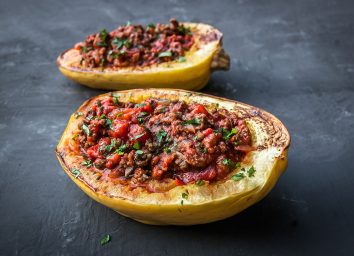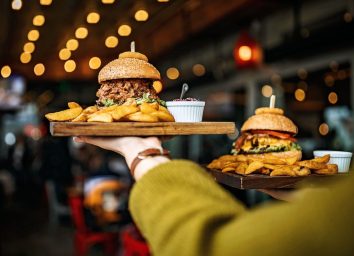40 Flat-Belly Truths You Must Know by 40

As you gracefully entered the fourth decade of your life, you likely had to accept that certain things just weren't going to happen for you. For instance, you'll probably never be able to fly, lift up a bus, or go to the moon—facts that would surely crush the soul of your 4-year-old former self. And then there are all those body-related realities that so many of us turn a blind eye to because, frankly, we just don't want to think about them. Like the fact that it becomes increasing difficult to maintain a flat belly as we grow older—all because we lose muscle mass and metabolism "speed" as we age.
Too-tight jeans, cellulite, and an increased risk of weight-related diseases don't have to be your future, though. It's totally possible to maintain or even drop pounds as each birthday passes—so long as you're strapped with the right knowledge, at least! We've gone ahead and gathered all those must-know facts into this trusty guide, so you can combat that belly fat the right way. And be sure you're trying out these 21 Best Healthy Cooking Hacks of All Time.
Losing Weight Gets Increasingly Difficult
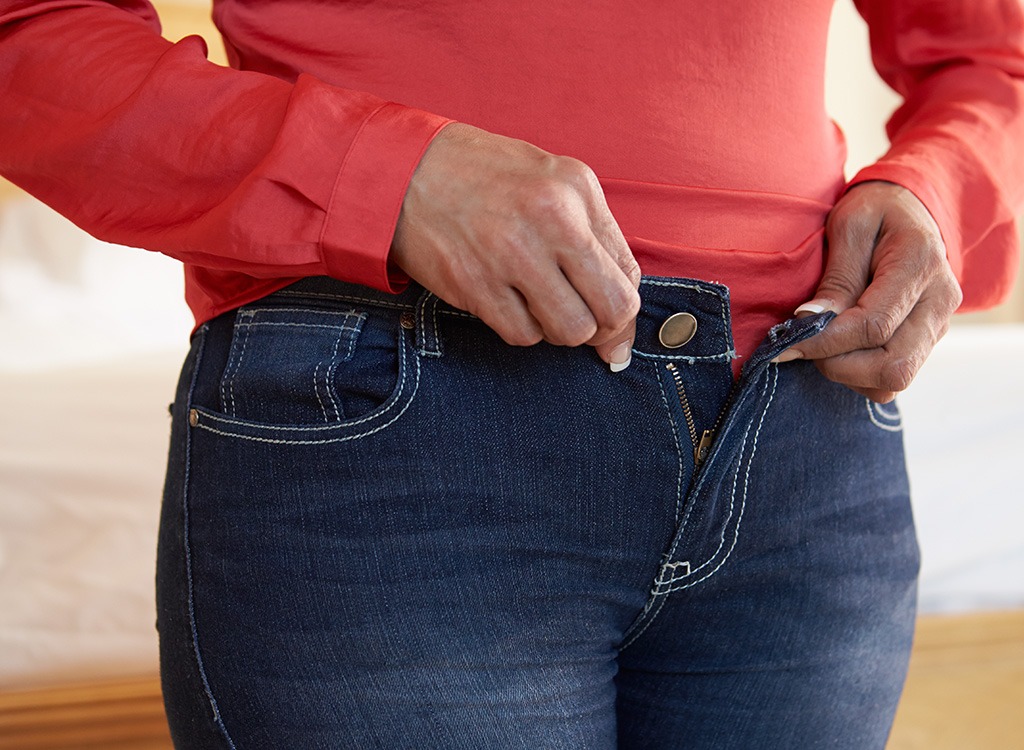
First thing is first. You need to accept the fact that the same weight loss tricks that worked for you in your 20's and 30's may not do the trick anymore. Odds are that simply skipping dessert or cutting out booze for a month may not help you lose five pounds like it once used to. While it's still possible to slim down, it just takes a bit more of an effort.
The Pound-a-Year Curse is Legit
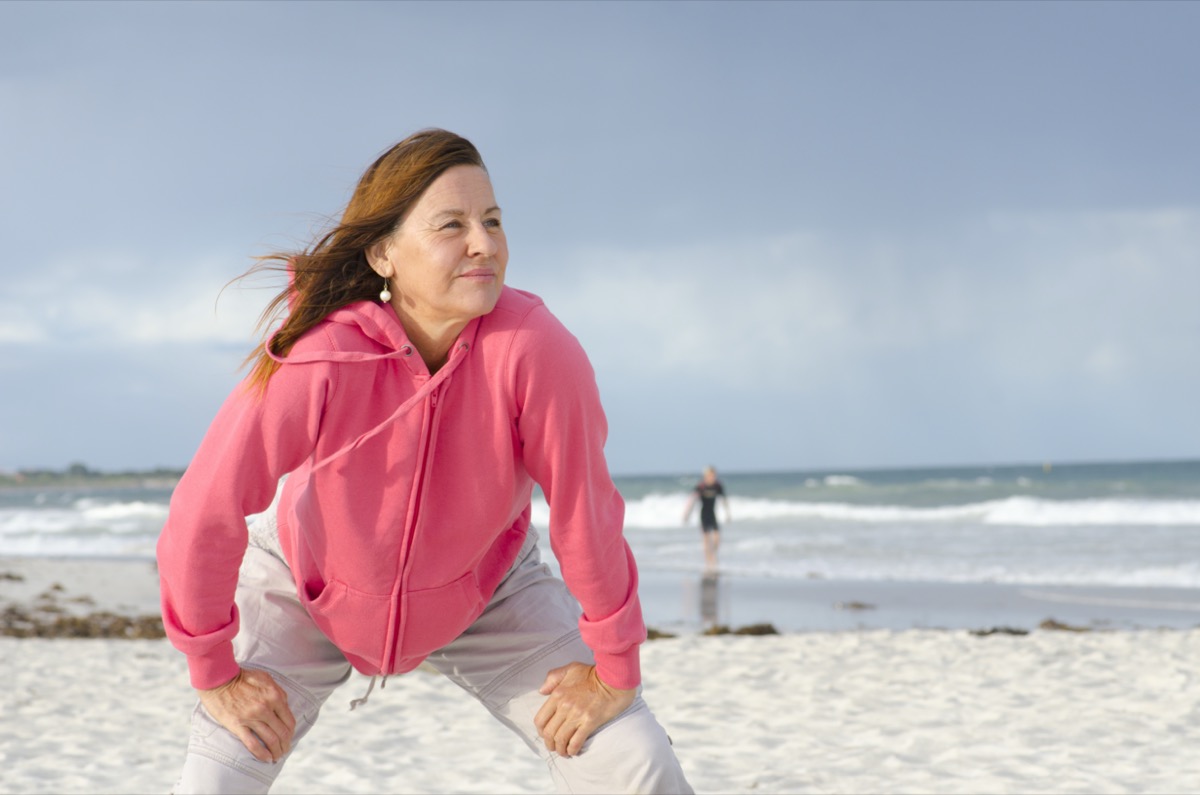
The bad news: People tend to gain one pound every year in their 40s and 50s. The good news: While hormonal changes can have a negative effect on body composition, most of those extra pounds can be attributed to a drop in activity. Simply put, it's your hectic schedule that's to blame—not your aging body. That means it's totally possible to take control and fight back against the creeping poundage. In fact, here are 50 Ways to Lose 10 Pounds—Fast.
Fermented Foods Are Your Friends

Your forties are when digestive problems can start to show up, especially if your long-time diet has included a lot of processed foods. A good way to combat that? Fermented foods, which naturally contain beneficial bacteria to your diet. "A daily serving of sauerkraut, kimchi, kefir, sour pickles, kombucha, or live culture yogurt can help balance your gut bacteria," says Dr. Rob Silverman, DC of NY ChiroCare. "I also suggest starting a daily probiotic supplement to keep the beneficial bacteria in your gut working well to help digest your food. Choose a probiotic from a company that uses good manufacturing practices. The supplement should have a mix of different strains of bifidobacteria and lactobacillus bacteria."
Water Intake Effects Weight Loss
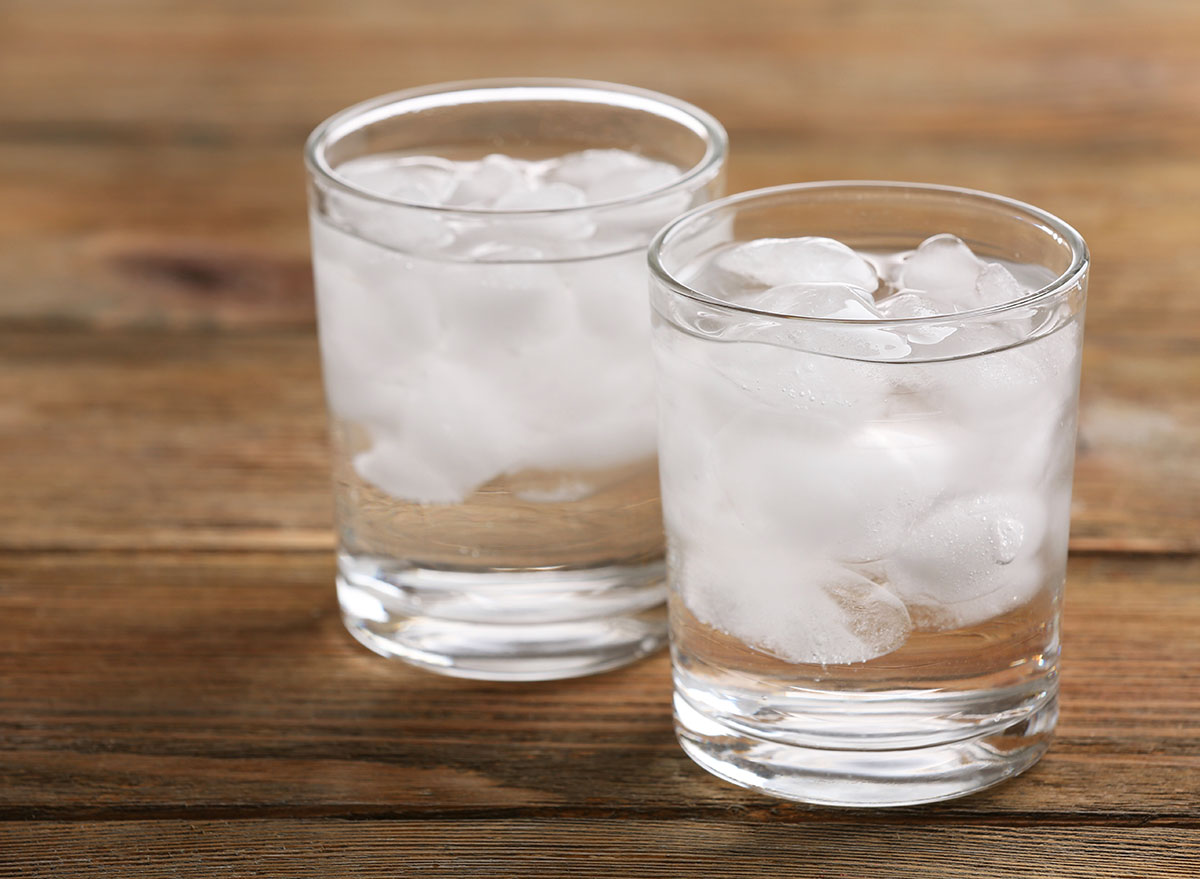
Upping your water intake is one of the simplest ways to supercharge your weight loss results at any age and can be especially helpful as you get older. According to a study published in the journal Obesity, drinking 16 ounces of water before meals can lead to greater weight loss, rather than digging into your meal while you're parched. Water fills you up and helps increase feelings of fullness, causing you to eat less and curb cravings. To supercharge your weight loss further, sip between meals, too. A study in the journal Physiology & Behavior suggests people inappropriately respond to thirst more than 60 percent of the time by eating instead of drinking. Even if you're not hankering for a thirst-quencher, drink a glass of water before you grab a snack to make sure you're actually hungry.
Certain Foods Have Superpowers
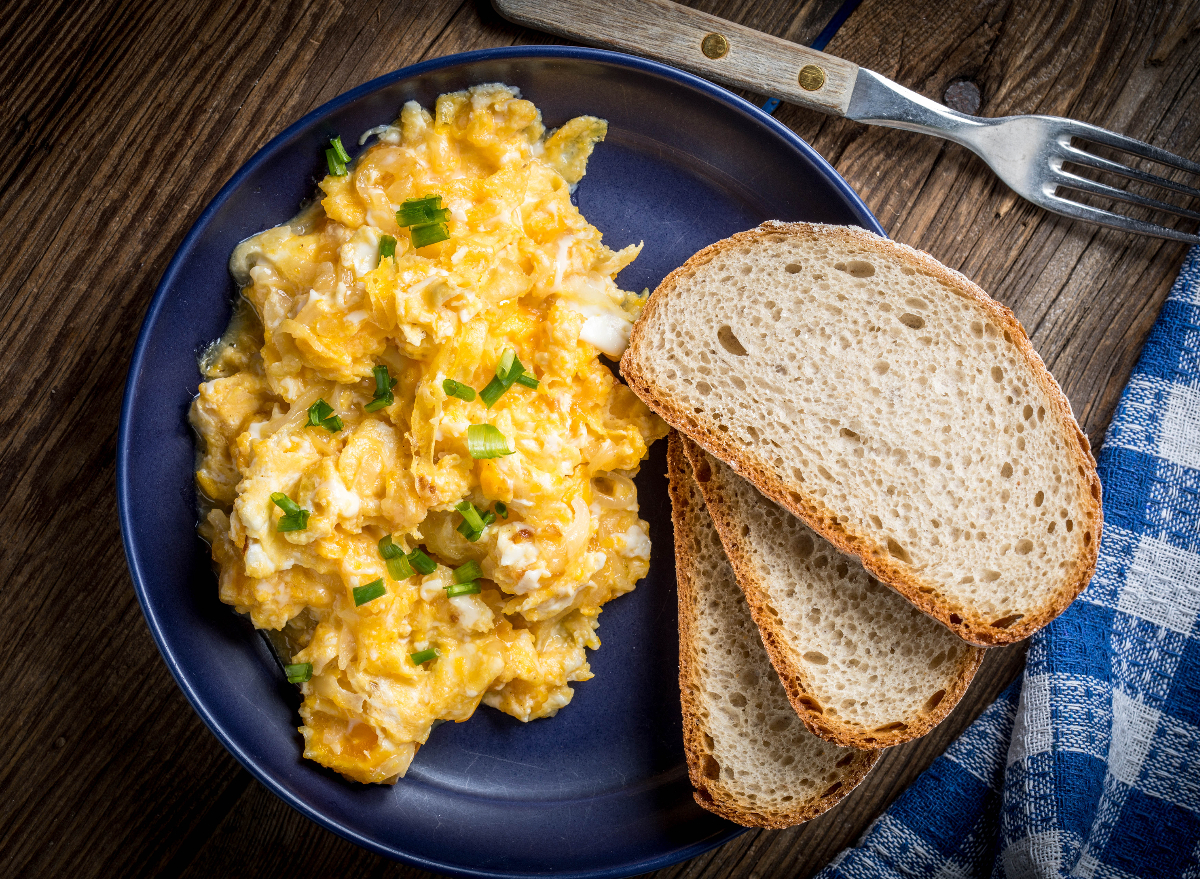
When deciding what to add to your weight loss diet, don't just grab things that are low in calories or marked as weight loss friendly. Be sure to incorporate grocery staples that have weight loss superpowers, too. Eggs, for example, are a potent source of vitamin D (a vitamin most Americans don't get enough of). Low levels of vitamin D have been linked to abdominal obesity. Also, the healthy fat within the yolks will help you feel fuller longer and less likely to overeat later in the day, explains Kayleen St. John, RD. To discover more foods with hidden flat belly talents, check out these 32 Food Pairings that Dial Up Your Weight Loss.
Crunches Won't Help

Think you can crunch and plank your way to a flat stomach? Not necessarily! "I'm not a fan of situps and even my clients like 50 Cent don't perform them," says Jay Cardiello, celebrity fitness and nutrition expert. "Instead, perform full-body exercises that reduce your overall percentage of body fat and engage the core." You'll burn more calories and see better results by following this approach.
Fruit Sugar Isn't the Enemy
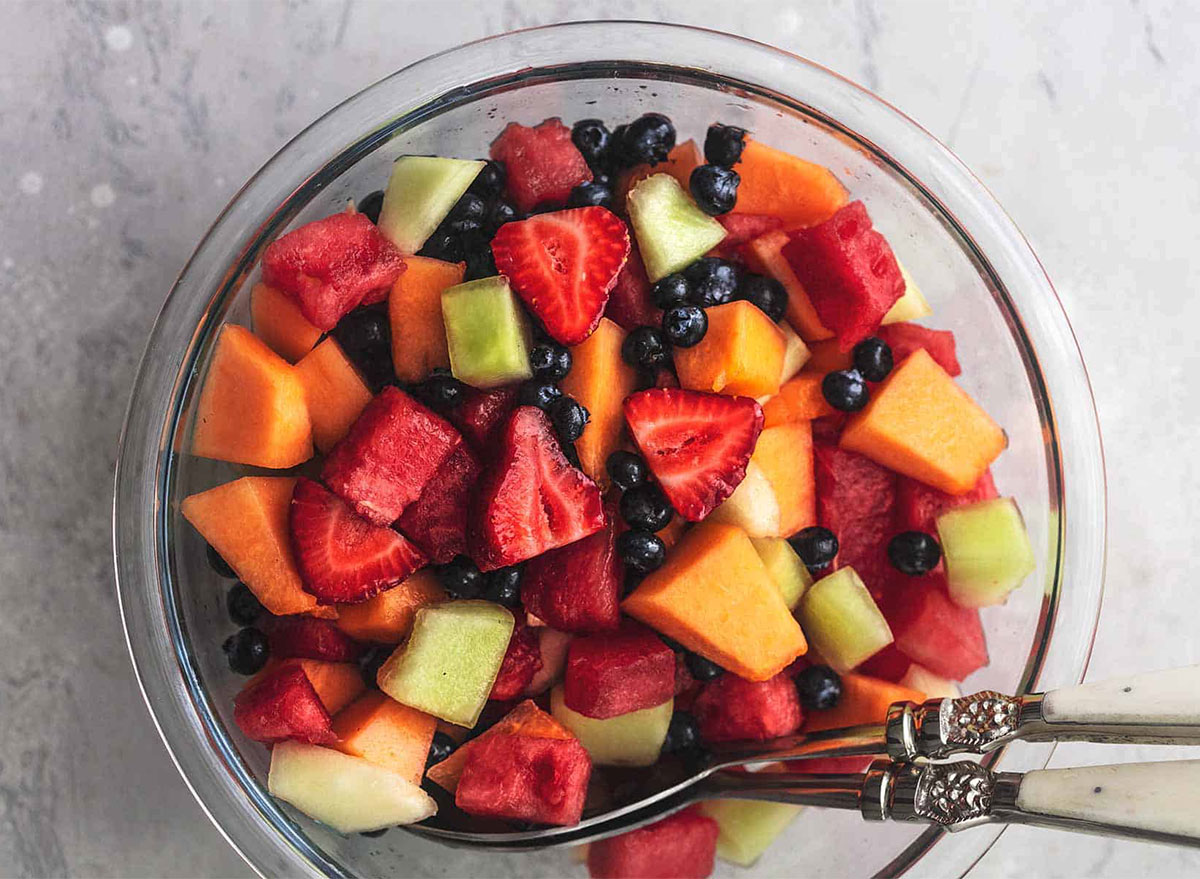
You know you should be eating less sugar, but that doesn't mean you should cut back on natural sources of the stuff (like what's found in things like produce and dairy). In fact, saying "No, thanks" to that apple or banana is a huge mistake. 'The sugar found in whole fruits acts differently in the body than added sugars. [For example], bananas are often cited as being 'high in sugar' but are very high in potassium and definitely contribute to a flatter belly," explains, St. John. Fruit is also an excellent source of fiber and water, two nutrients that aid feelings of fullness (something that tends to become harder to achieve with age), and subsequently, aid weight loss. To dial down on sugar while still reaping the benefits of produce, check out our report, 25 Popular Fruits—Ranked by Sugar Content!.
Skipping Meals Doesn't Aid Weight Loss
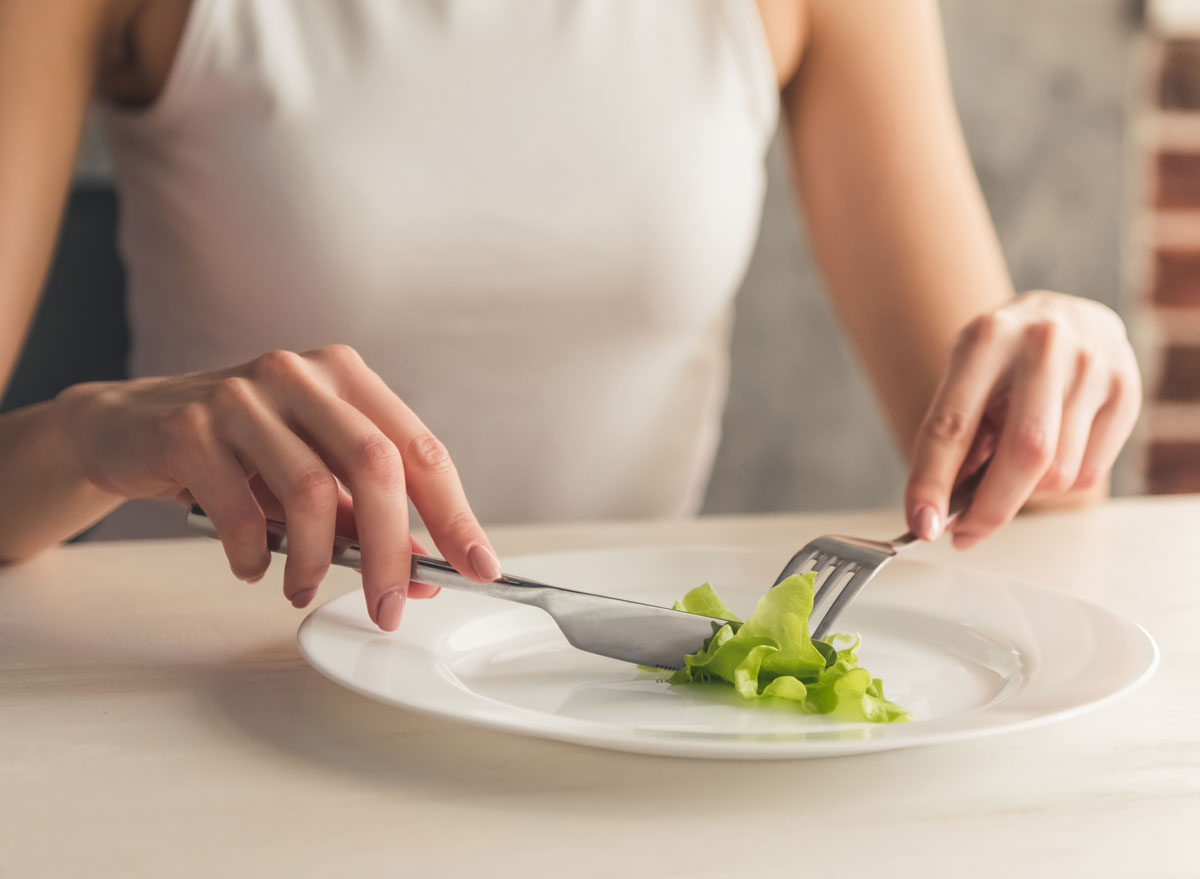
"In the past, skipping meals might have helped you reach your weight loss goal, but after a certain age, the body wises up," cautions Lisa Moskovitz, RD, CDN and founder of The NY Nutrition Group. "The more you try to restrict, the more your body will store calories as fat in case it needs to use them. It's important for health, energy, and metabolism to eat every four to five hours." Nutritionist Elisa Zied agrees and suggests consuming low-calorie, filling foods (like vegetables, fruits, and lean proteins) to promote a slow, steady weight loss.
Your Metabolism Will Slow Down
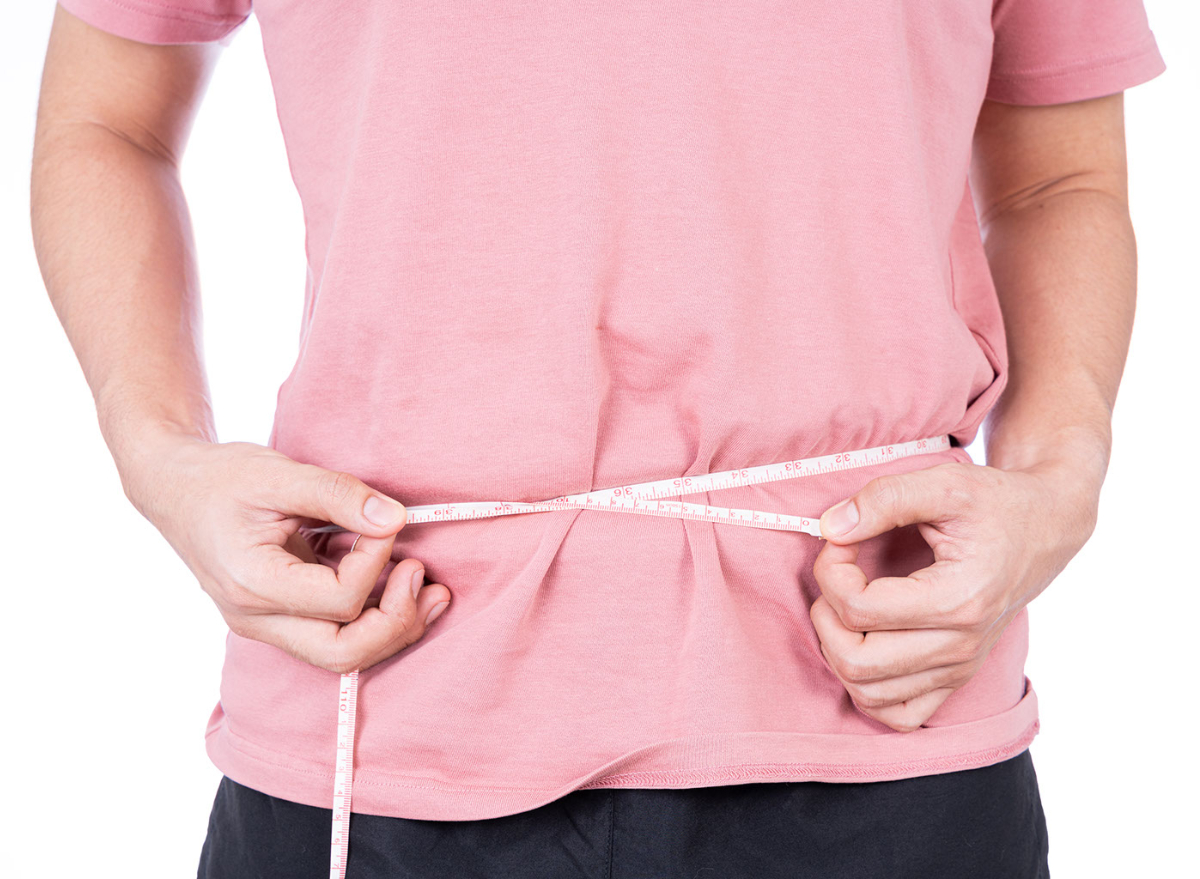
Metabolism dips in your 40s, making it all the more important to build new muscle and maintain the quads and biceps you've already got. All it takes is two days per week in the weight room, so don't freak out! Why's it important to pump iron? The more muscle you build, the more calories you'll burn each day at rest. Plus, when you lift weights, you're putting micro-tears in your muscles. The rebuilding process requires energy, boosting your daily calorie burn by up to 9%.
Carbs Can Keep You Slender
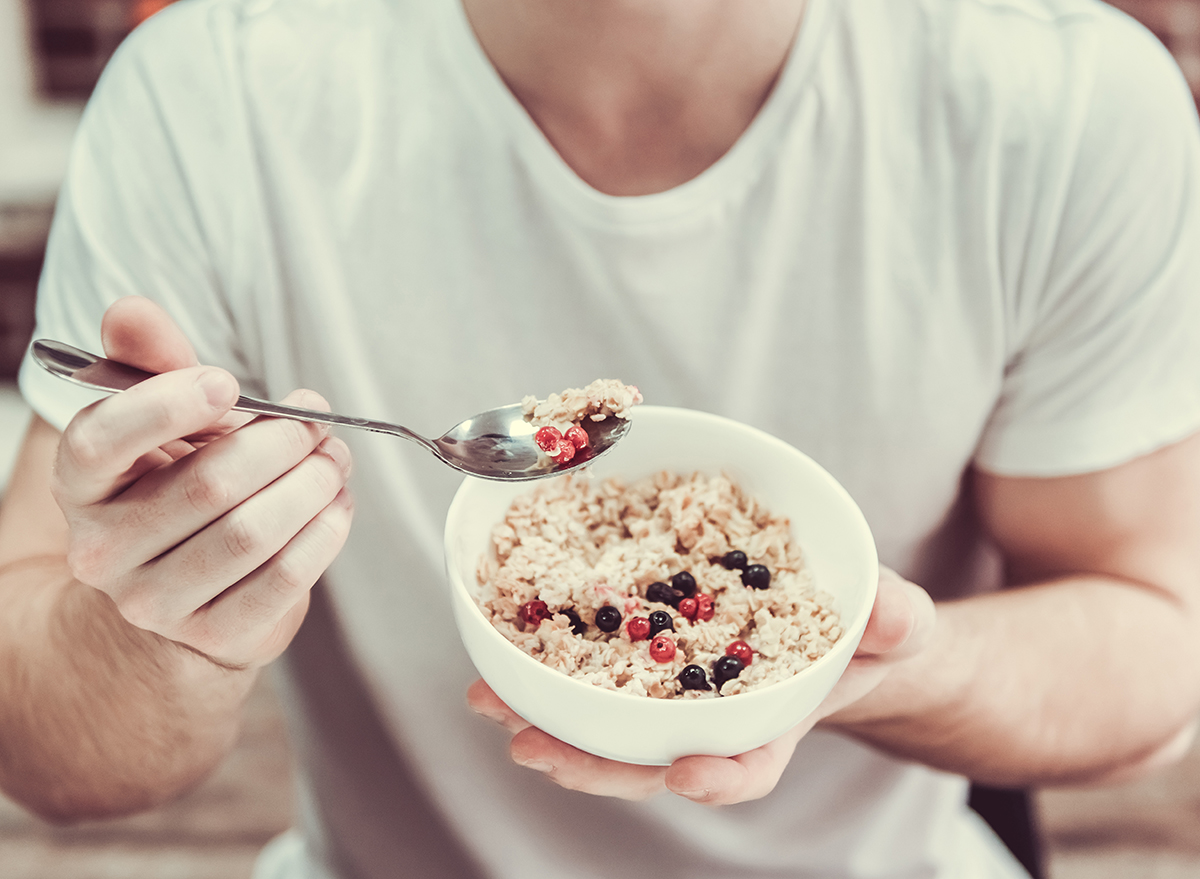
As you age, your metabolism slows, so portion control and nutrient-dense foods—including healthy carbs—become more important. Carol Cottrill, a nutritional consultant and author, recommends eating unrefined whole grains like whole wheat, brown rice, and oatmeal to help keep blood pressure and cholesterol in check. "They help digestion and make you feel full on less food," she says. "And you'll enter your fifties in great shape."
Your Marriage Could Be Making You Heavy

If you've noticed that you've become softer around the middle since tying the knot a few years ago, you're not alone. A Southern Methodist University study found that happy couples tend to gain weight after marriage. It's totally understandable, too. At first, your sweetie's knack for whipping up a dynamite batch of chocolate chip cookies was cute and fun; but over time, those small indulgences may start causing the scale to tip in the wrong direction. Does that mean you're destined to gain even more pounds? No, of course not! Just keep these 20 Ways to Avoid Relationship Weight Gain in mind.
It's Possible to Eat Too Much Protein
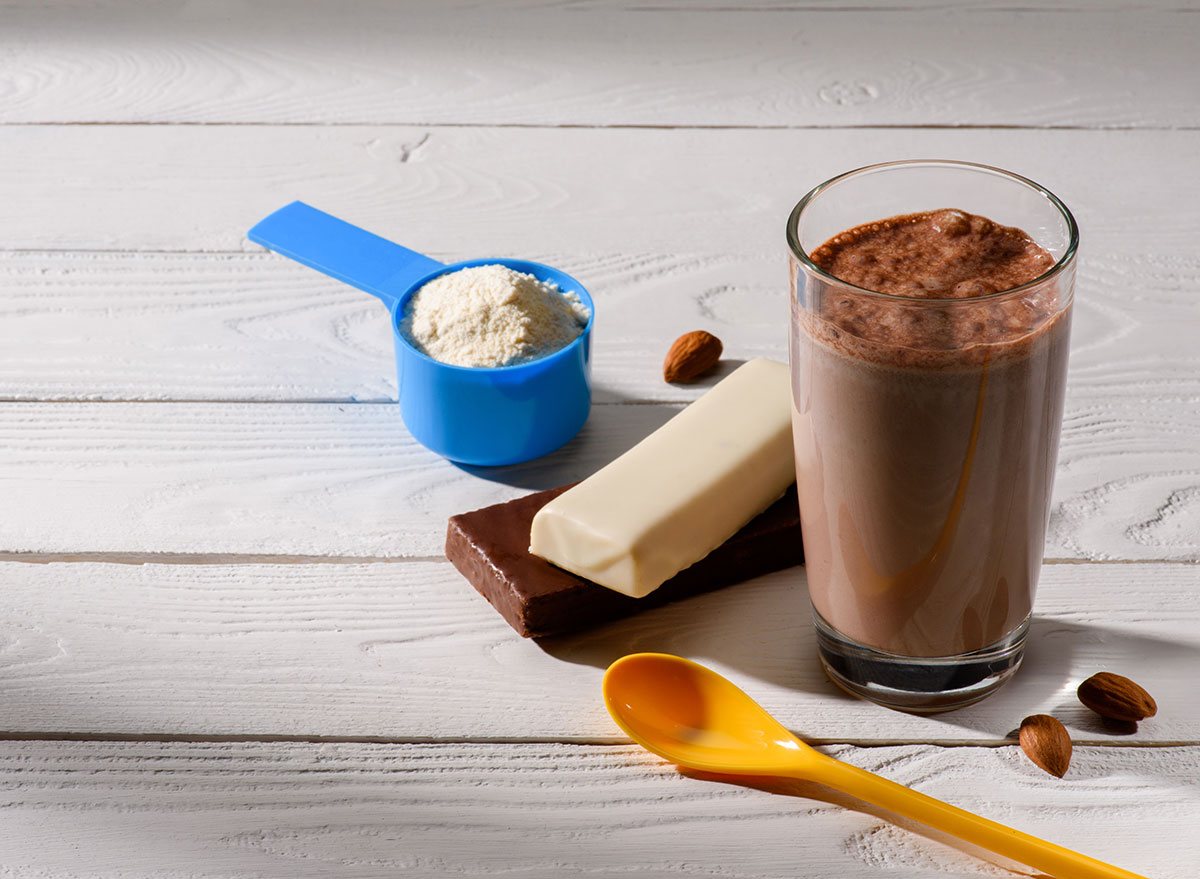
One scan of the grocery store and it's clear: Our culture is obsessed with protein. From pudding and pancake mix to milk and yogurt, nearly everything has gotten pumped with an extra dose of the nutrient. Protein aids muscle growth, wards off hunger and aids weight loss, so this culinary revolution may seem like a good thing. But getting too much can have some serious consequences for your waistline. When you take in more protein than your body needs (which is about 0.45 grams per pound for men and 0.35 grams per pound for women) the extra protein will likely be stored as fat, while the excess amino acids will simply be excreted. Our advice: Worry less about eating a ton of protein and fill up on some of these 30 Foods That Uncover Your Abs for Under $1.
Salt Can Stall Weight Loss
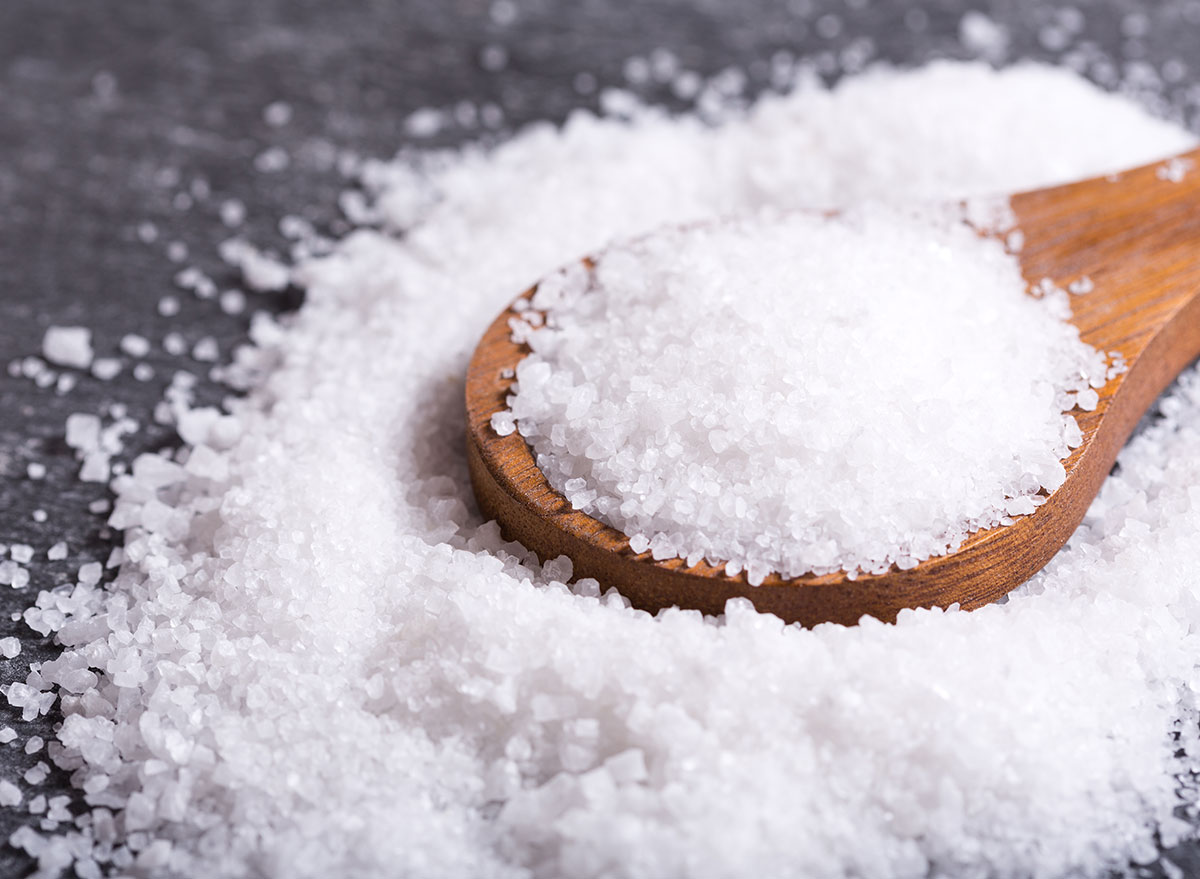
If packaged snacks and restaurant fare are cornerstones of your diet, your salt-filled diet is likely to blame for your widening waistline. And it's not all water weight, either. According to a new study, salt actually messes with the messages your body sends itself. "Our body has biological mechanisms to tell us when to stop eating, and fat activates those mechanisms in people who are sensitive to the taste of fat," lead author Russell Keast said in a statement. "However, when salt is added to the food, those mechanisms are blunted and people end up eating more food. This can cause you to eat more fatty foods, and over time, your body adapts or becomes less sensitive to fat, leading you to eat more to get the same feelings of fullness."
When cooking at home, use fresh herbs instead of salt. Dining out? Scan nutrition info at home before you head out and pick a low-cal dish with about 1,000 milligrams of sodium or less. Can't be bothered? Many of the options in our report The #1 Healthiest Menu Option at 40 Popular Restaurants fit the bill!
You Have to Exercise More Than You Think
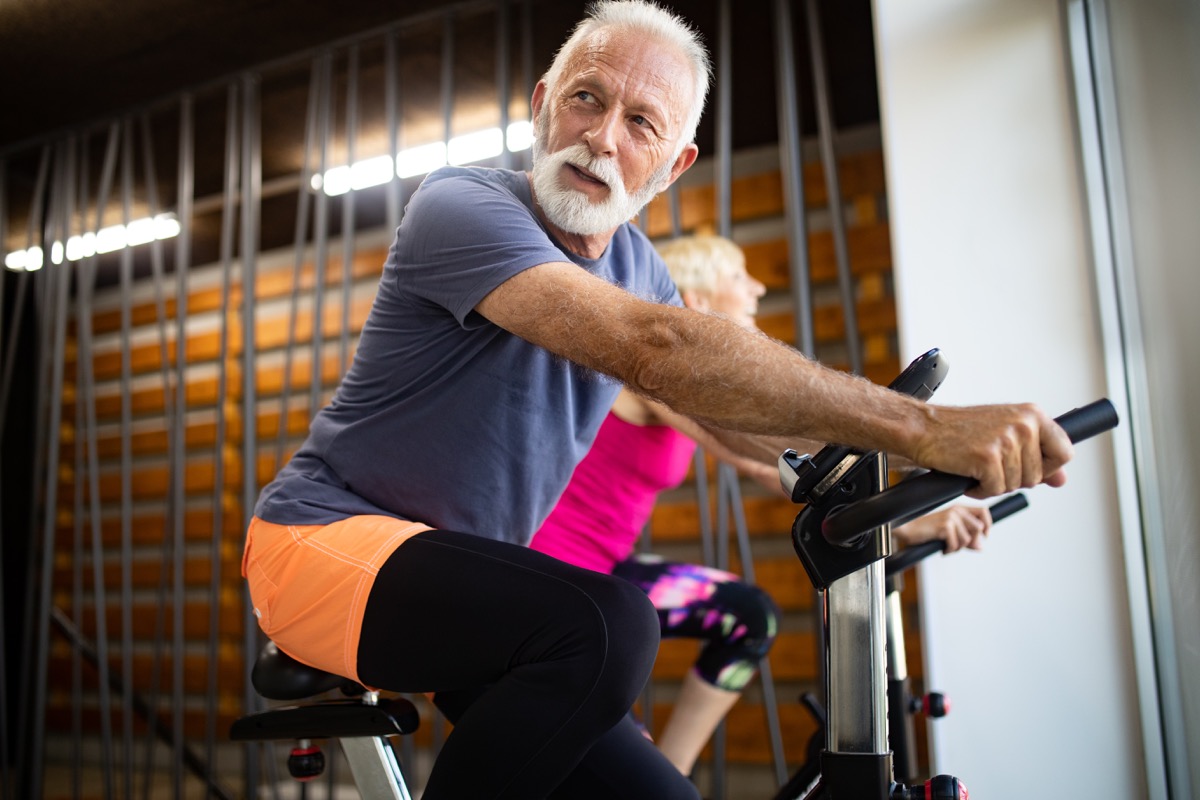
You might have read at one point or another that The Centers for Disease Control and Prevention (CDC) recommends getting at least 30 minutes of moderate exercise most days of the week; luckily this includes things like shoveling snow and gardening. And while this is great for protecting heart health and warding off disease, you'll need to get about an hour of activity a day to actually lose weight—especially once you're middle-aged. Members of the National Weight Control Registry (NWCR)—a group of over 5,000 people who have lost an average of 66 pounds and kept it off for five and a half years—exercise for about 60 minutes every day. While that may seem like a super long time, it's really not. Most fitness classes are an hour, and they go by much quicker than a treadmill run. Another idea? Grab a friend and go on a walk, and try some of these 30 Tips When You're Walking for Weight Loss to get the most out of your workout. NWCR members most frequently report walking as their go-to form of exercise. So, we can say with confidence that it's an effective strategy.
Yes, You Do Have Time to Workout

"Everyone likes to complain about not having enough time in their day, but you absolutely have the time, if you make healthy living a priority. We all seem to find that extra hour to watch Netflix don't we?" jokes personal trainer Dean Sheremet. Not only can using your TV time as fitness time help you lose LBs, it can also help keep diseases at bay. A recent analysis of studies found that for every two hours spent watching TV, the risk of early death and/or developing diabetes or heart disease increased by 13, 20, and 15%, respectively. Scientists are still figuring out exactly why sitting is so detrimental to health, but one obvious and partial explanation is that the less we move, the less fuel we require; the surplus blood sugar floods the bloodstream and contributes to diabetes and other weight-related risks that crop up in our forties and beyond.
More Sleep = More Weight Loss

In your fourth decade of life, things like business trips, carpools, and helping elderly parents seem to fill up your calendar, leaving you little to no time for sleep. When you're burning the candle at each end, it's usually one of the first things to go—but it really shouldn't be. Even though it may seem near-impossible, you need to make your health a priority—and getting adequate shut-eye (which is defined as at least seven hours per evening) is a major part of that. When you don't get enough sleep, levels of the stress hormone cortisol increase, triggering fat storage. Sleep deprivation also interferes with recovery, so you won't be able to work out as hard when you hit the gym. If you have trouble sleeping, stop drinking caffeine after lunch, limit your alcohol consumption (which ruins sleep quality), and try some of these 30 Things to Before Bed to Lose Weight, too.
It's Possible to Overeat Healthy Food
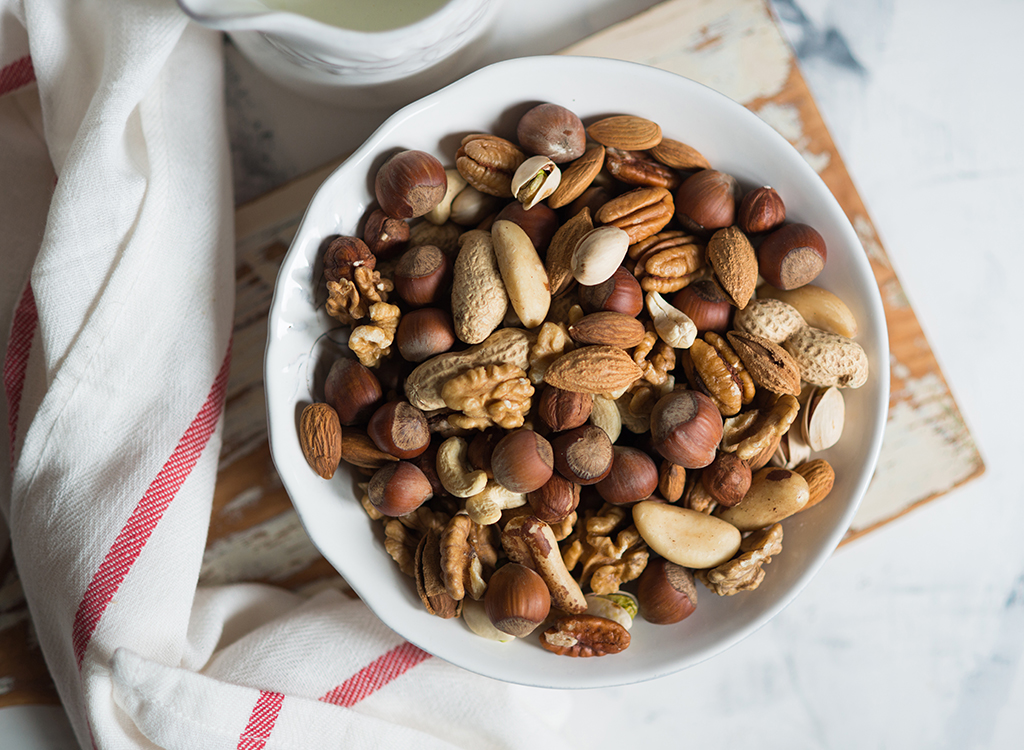
Avocados, oatmeal, nuts, and their creamy, delicious butters are indeed healthy, but low in calories they are not. Whether you're eating a slice of cake or a homemade trail mix, portion size counts—big time. If you find that you have trouble sticking to reasonable portion sizes for some of the more caloric healthy foods in your diet, look for portion-controlled packages. Emerald makes 100-calorie almond and walnut packs, Wholly Guacamole sells 100-cal guac, numerous brands sell small oatmeal packages, and Justin's has a line of individually-portioned nut butters. Buying mini sizes in lieu of bigger tubs of food can help keep calories in check and teach you what a proper serving looks like.
Fiber and Flat Abs Are Synonymous
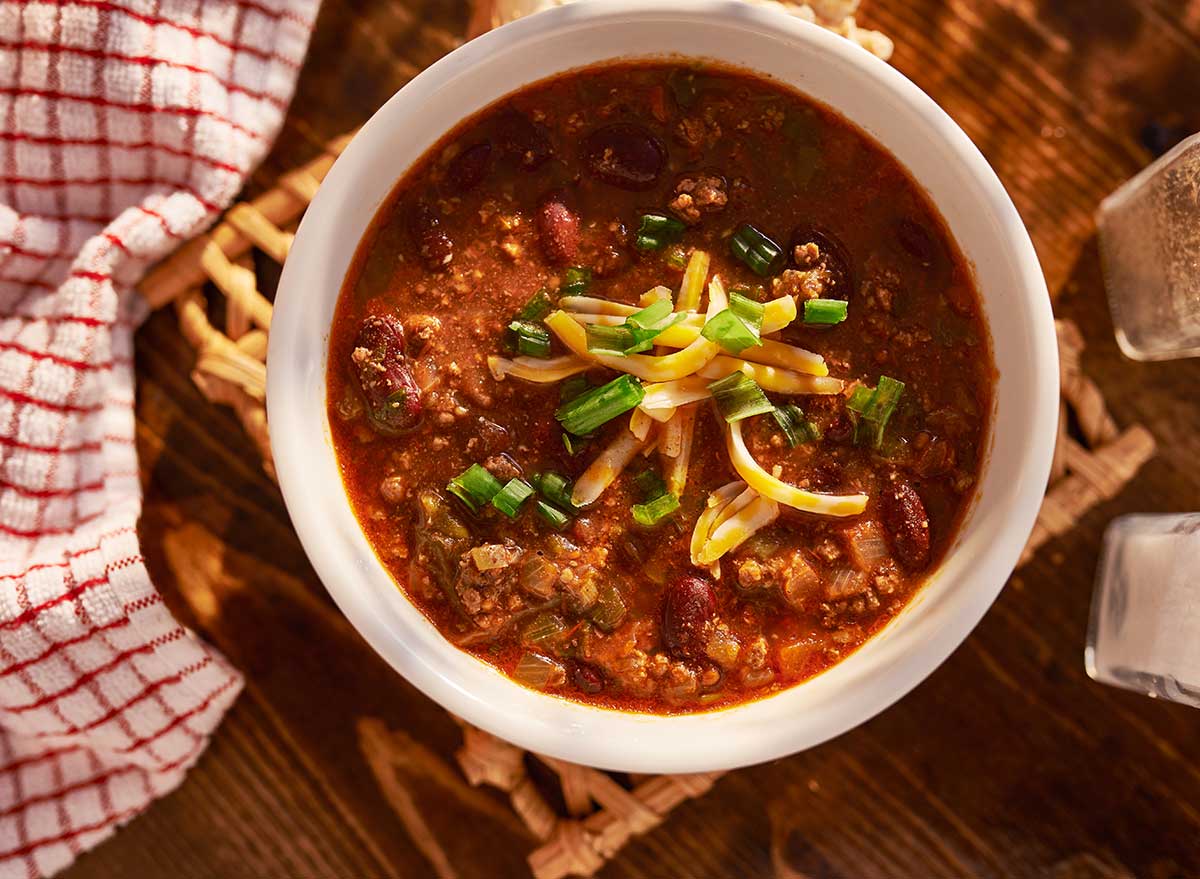
In your forties and fifties, the body's requirements during perimenopause and menopause for women and man-o-pause for men require an increase in calcium-rich foods, as well as hormone-balancing meals. "To balance hormones, such as leptin, the diet must contain high fiber vegetables to stabilize leptin levels by making you feel full longer. They'll balance cortisol, vitamins, minerals, antioxidants," explains Lisa Avellino, Fitness Director at NY Health and Wellness. "The fiber found in cabbage, broccoli, or Brussels sprouts help stabilize blood sugar and insulin by slowing down digestion." For more high-fiber foods that can help you trim down, check out our special report, 30 High Fiber Foods that Should Be in Your Diet.
Artificial Sweeteners Are the Devil
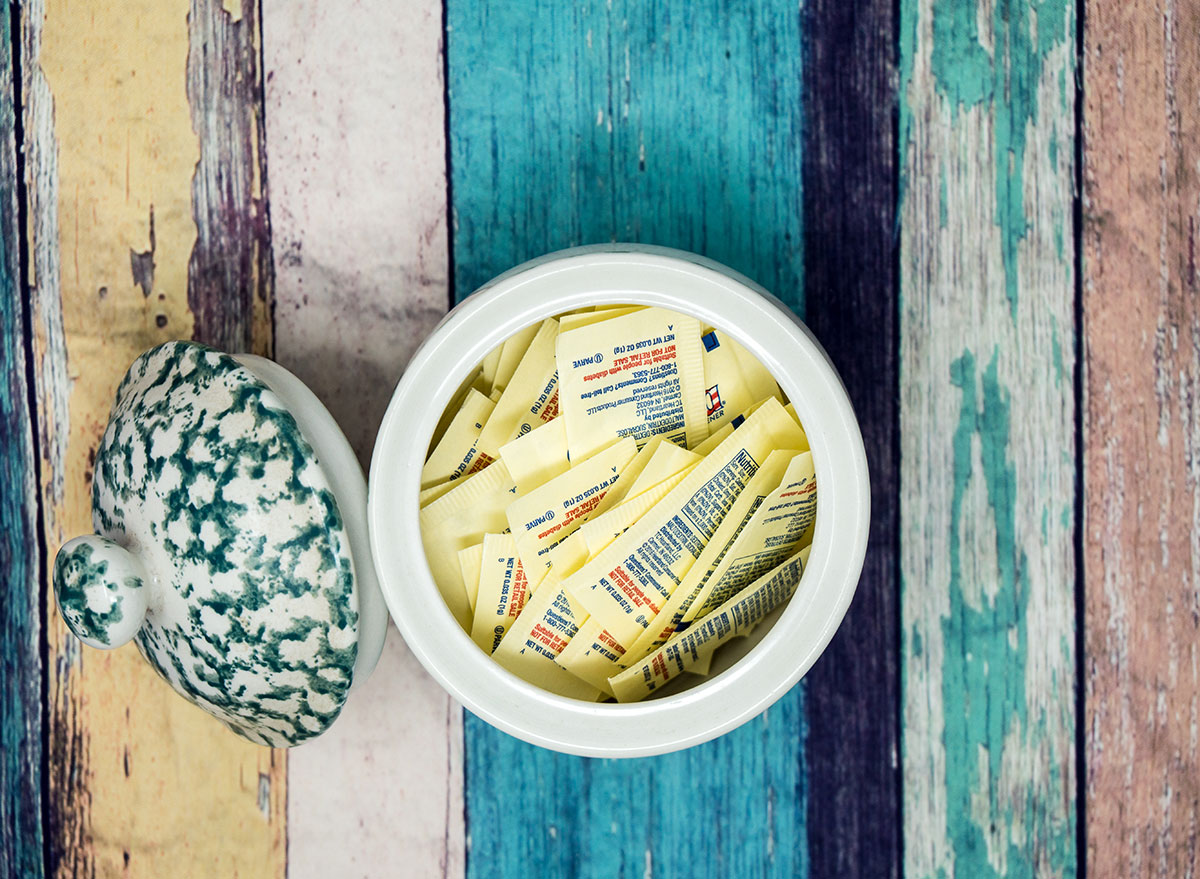
If you've gained girth after 40, it may be a sign that your liver isn't functioning optimally. Avoiding toxins will help it work more efficiently—and slim your middle, too. Cutting down on sugar, artificial sweeteners, and trans fatty acids can help get your body back on track.
If You Hate Your Workout, You Won't Work Out

If you don't enjoy it, chances are you won't do it. All too often, exercising can feel like another item on the to-do list that just keeps getting pushed off. As people age, they can get in a workout rut, personal trainer Jim White tells us. "They've been working out their whole life, fall into the same patterns, and lack that zeal that they had when they had a lot of strength and energy when they were younger. I think with this group, the key is to try to find entertaining classes like Flywheel or Zumba. By finding fun ways to lose weight, we're more easily able to stay accountable to," says White. Plus, a study published in the journal Marketing Letters found that, if you view working out as fun, you're less like to eat more food afterward. That's what we like to call a win-win! For more enjoyable ways to shed pounds, don't miss these 35 Fun Ways to Lose Weight.
Same Routine = Stalled Weight Loss

Not only should you find a workout you love, you should find ways to mix up your routine from time to time, too. "Exercising in a different way or at a higher intensity may help get your metabolism back to where it once was," says Leah Kaufman, MS, RD, CDN. "Changing up your routine can increase the speed at which your body is burning calories," she says. Typically take indoor spin classes? Try to fit in a few monthly outdoor rides, too. Or simply vow to try a new workout class two or three times per month. Not only will you challenge your muscles in new ways, you may just find a new workout you never knew you loved.
A "Clean" Diet Is The Best Diet
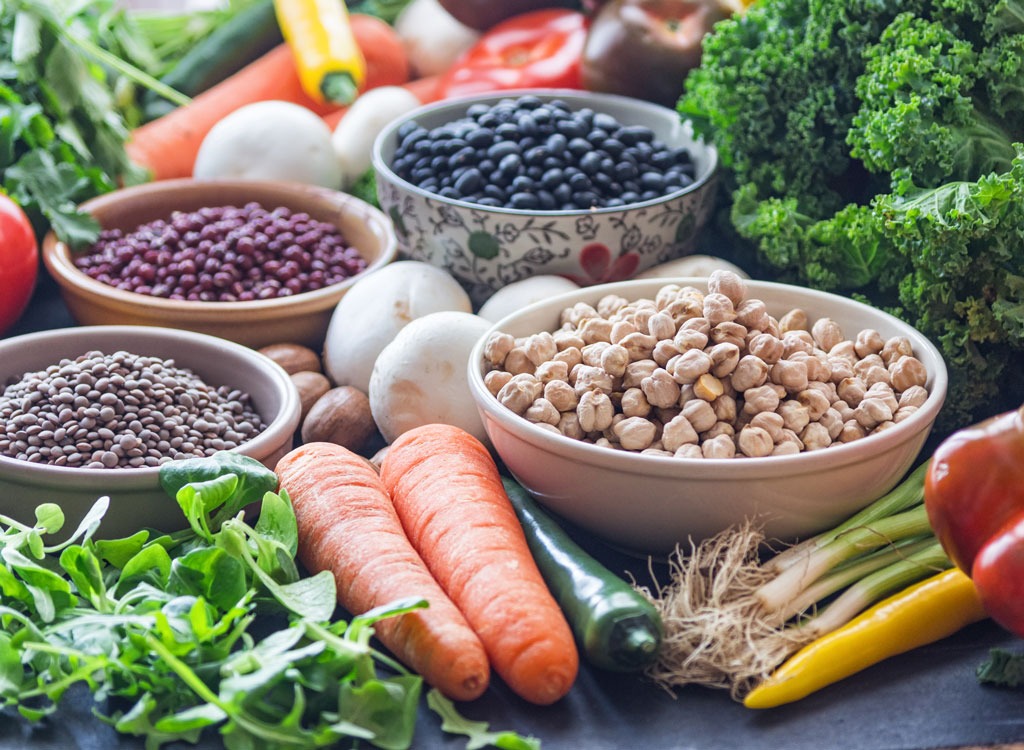
Forget going Paleo, low-carb, or vegan. The best diet you can eat is a clean one. While aging plays a big role in your ever-slowing metabolism, the chemicals and preservatives in our foods—like pesticides, growth hormones, trans fats, and high-fructose corn syrup—can cause metabolism to take a hit, too. Basically, if your body is spending time figuring out how to process these unknown substances, it can't process calories, fat, and other nutrients as efficiently. This can cause your metabolism to slow over time. Not cool.
Not All "Health Food" Is Healthy
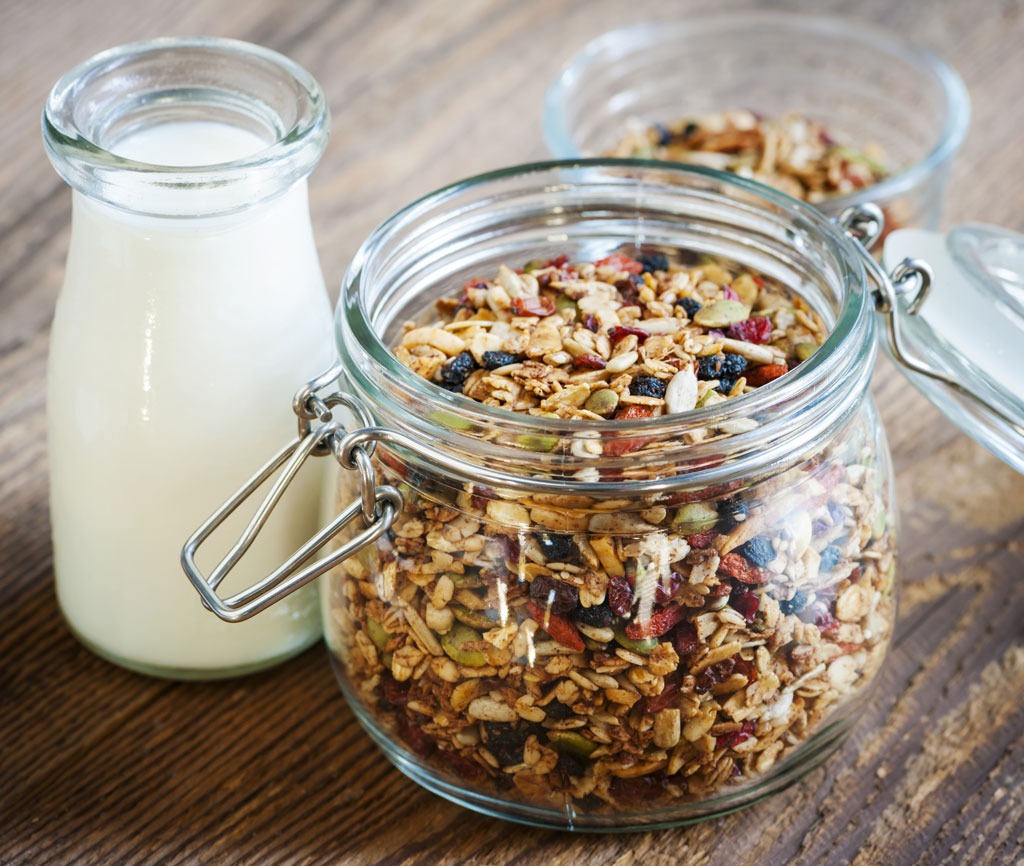
We live in an era where things aren't always what they seem. Abs are Photoshopped onto models and "pure pumpkin puree" is filled with a stand-in orange gourd called Dickinson squash. Even our fish isn't what it seems. While the chicken of the sea can be an impeccable source of lean protein and heart-bolstering omega-3 fatty acids, certain varieties and preparations can bloat your belly faster than Usain Bolt can run the 100. Let's look at farm-raised salmon (all Atlantic salmon is farm-raised) as an example. Although wild salmon is high in omega-3 acids (which fight weight gain-causing inflammation throughout the body), farm-raised salmon is packed with omega-6s (which actually increases the inflammation). Tilefish and swordfish are also bad news. They both contain dangerously high levels of mercury, which acts as an endocrine disruptor; that's a fake hormone that tricks your body into holding onto fat, burning fewer calories, and reducing levels of leptin, a good hormone that regulates appetite. Confused which fish are safe to eat and which are better to skip? Check out our exclusive report, Every Popular Fish—Ranked for Nutritional Benefits!
Obsessing About Weight Loss is Counterproductive
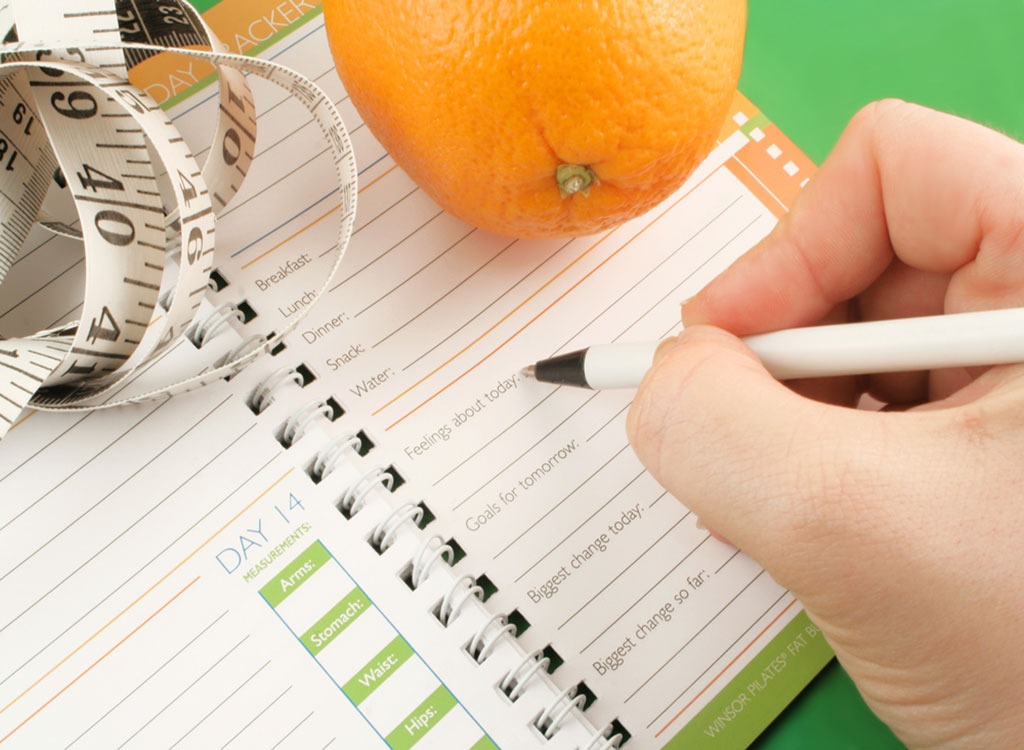
There's no denying that working out is an important weight loss factor. But oddly enough, thinking about your upcoming sweat sessions can make it more difficult to lose weight. Research indicates that when your favorite boot camp or running trail is always on the brain, your apt to consume more calories—likely because you assume you'll just blast it away once you break a sweat. So what should you do instead? Set it and forget it! At the beginning of each month, sit down with your iCal and plan out your workouts for the next month. This way, you aren't constantly thinking about your post-work gym sessions; you can just reference your calendar and go. How's that for a great weight loss tip?!
Booze Slows Your Progress
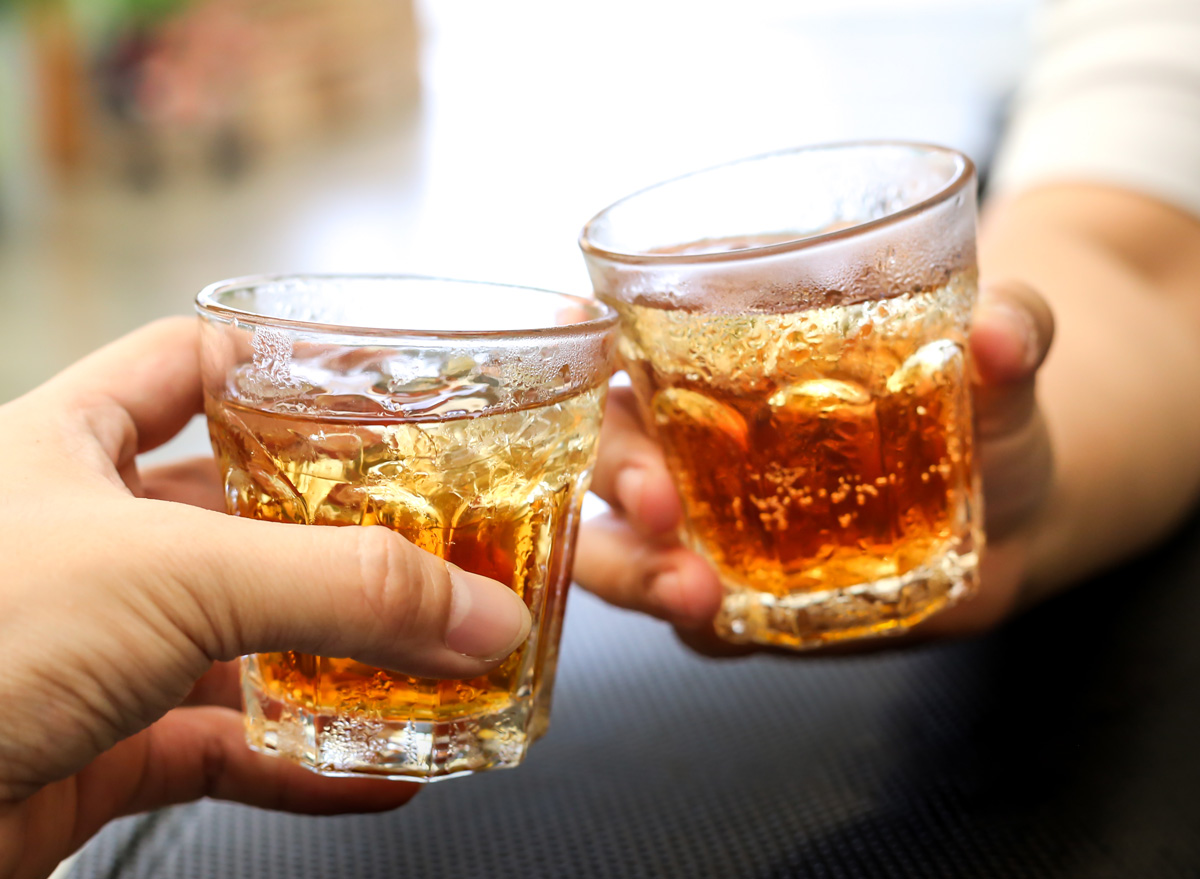
"Yes, drinking in moderation is better than downing an entire bottle yourself, but any amount of alcohol is bound to catch up with you," warns Martha McKittrick, RD, CDE. "As we age, the body doesn't metabolize alcohol as efficiently, and drunk junk food cravings become harder to ignore. It's also increasingly difficult to get a good night's rest with alcohol in your system. While you may have been able to get away with minimal sleep in your twenties, that's not the case in your thirties and beyond. Sleepless nights lead to carb and sugar cravings the next day, which can contribute to further weight gain." Yikes!
Low-Cal Is Rarely a Good Idea
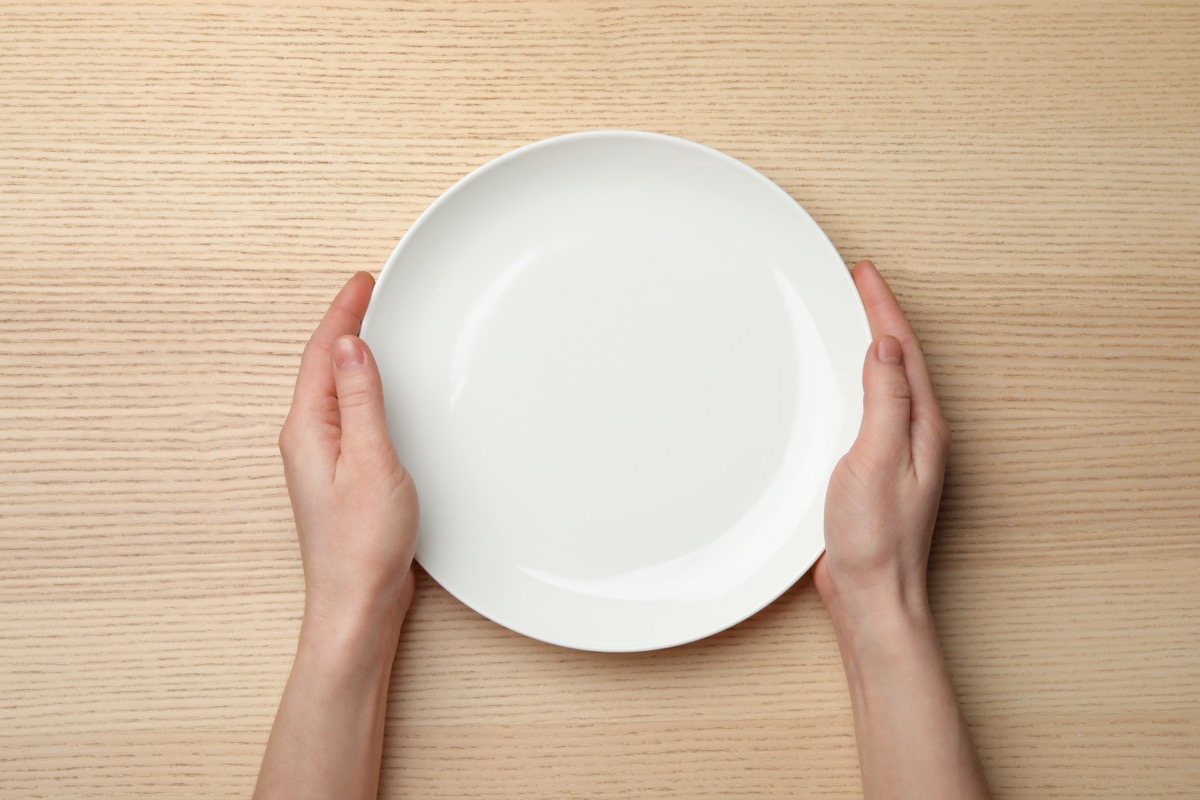
When you were younger, you may have been able to starve yourself to quickly lose 10 pounds, but this is almost impossible once the age 'odometer' turns to 40. Not to mention, it's really unhealthy. "Little by little, the metabolism slows down, and it's tougher to drop weight quickly. Also, when you're young, you can bounce back physically from a quick weight loss—but it will take its toll and can cause skin problems, hair loss and diminished energy when you try it [later in life]," warns Christine M. Palumbo, MBA, RDN, FAND.
Scales Are Irrelevant
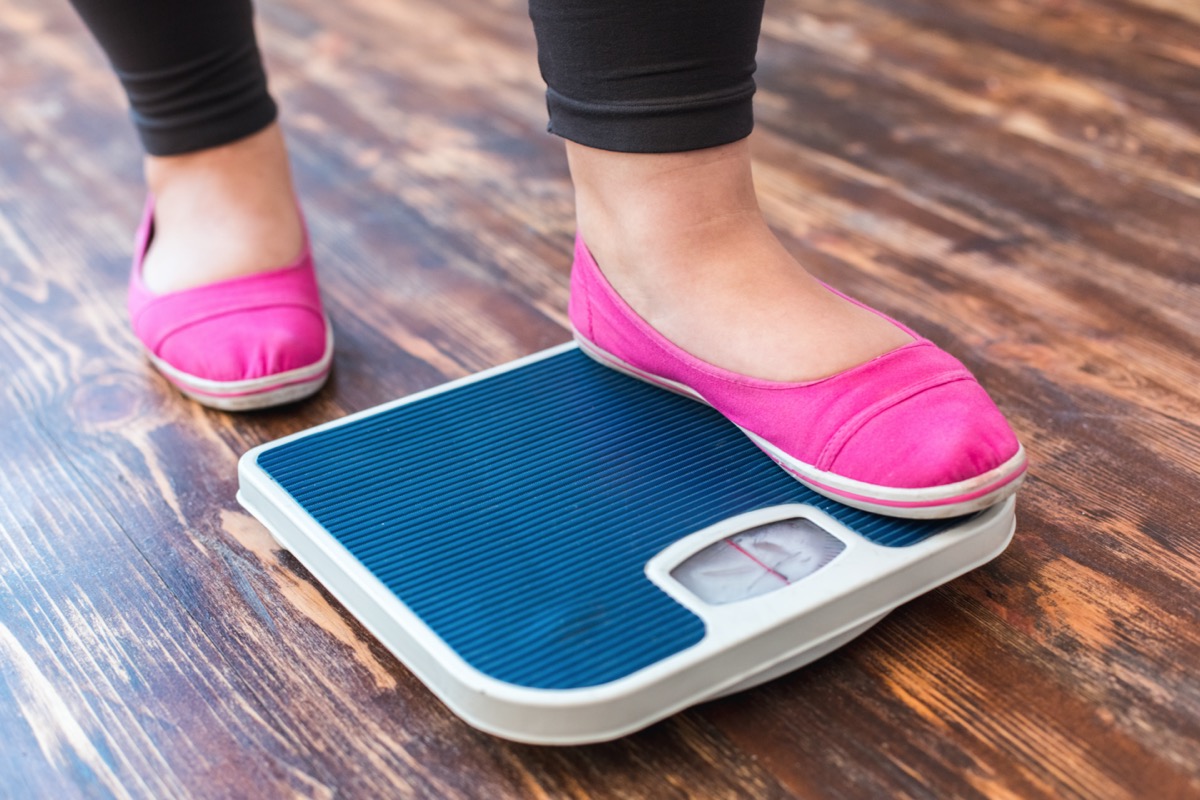
"While stepping on the scale can be a good measure of weight maintenance in your teens and twenties, things aren't as simple once you're older," says Marisa Moore, MBA, RDN, LD. As we age, we tend to lose muscle and store fat, but numbers on a scale won't necessarily reflect that. To catch onto body composition changes, use a pair of your favorite jeans instead of a scale. "Snug jeans are an indication that you should watch your diet and incorporate strength training into your fitness routine," Moore says. "This will help your body hold on to more muscle mass and keep your metabolic rate from plummeting."
Jeans Are a Dieter's BFF
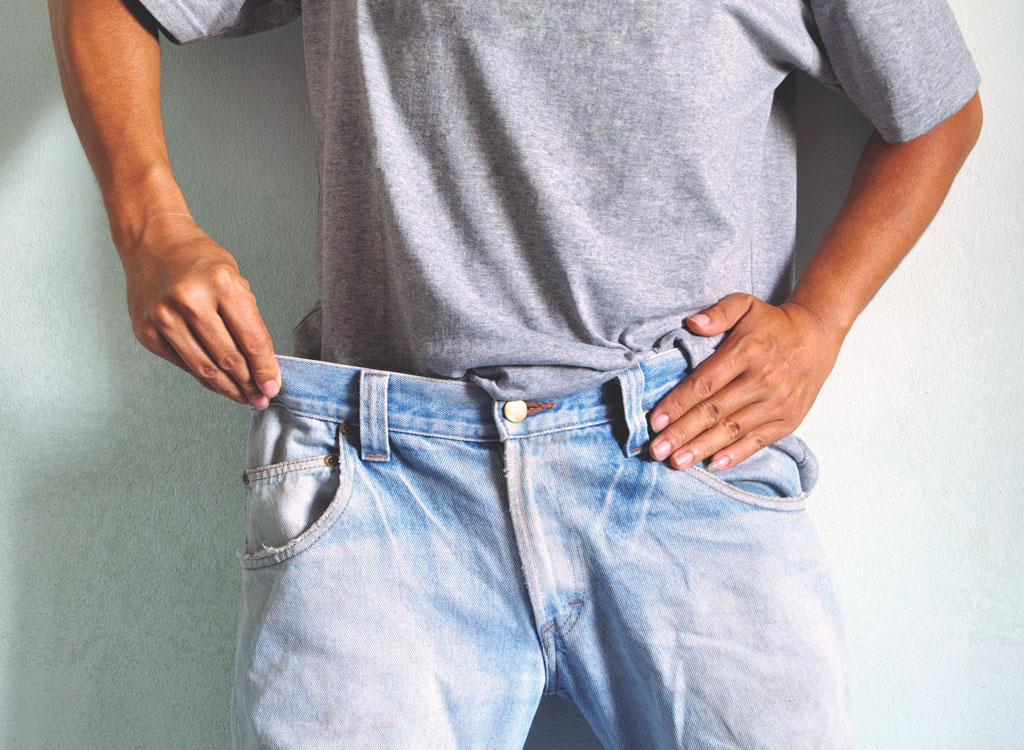
Another reason to add more jeans to your wardrobe? They're far comfier than things like suits and heels, so you're more apt to move about through the day—a habit that can contribute to faster weight loss. No, seriously! According to University of Wisconsin study, those who wear denim to work take almost 500 more steps (about a quarter mile) throughout the day than those who don more formal attire. Over time, those additional step can help you maintain your lean physique. For more simple ways to stay lean into later life check out these 30 Foods That Melt Love Handles.
All Calories Aren't Created Equal
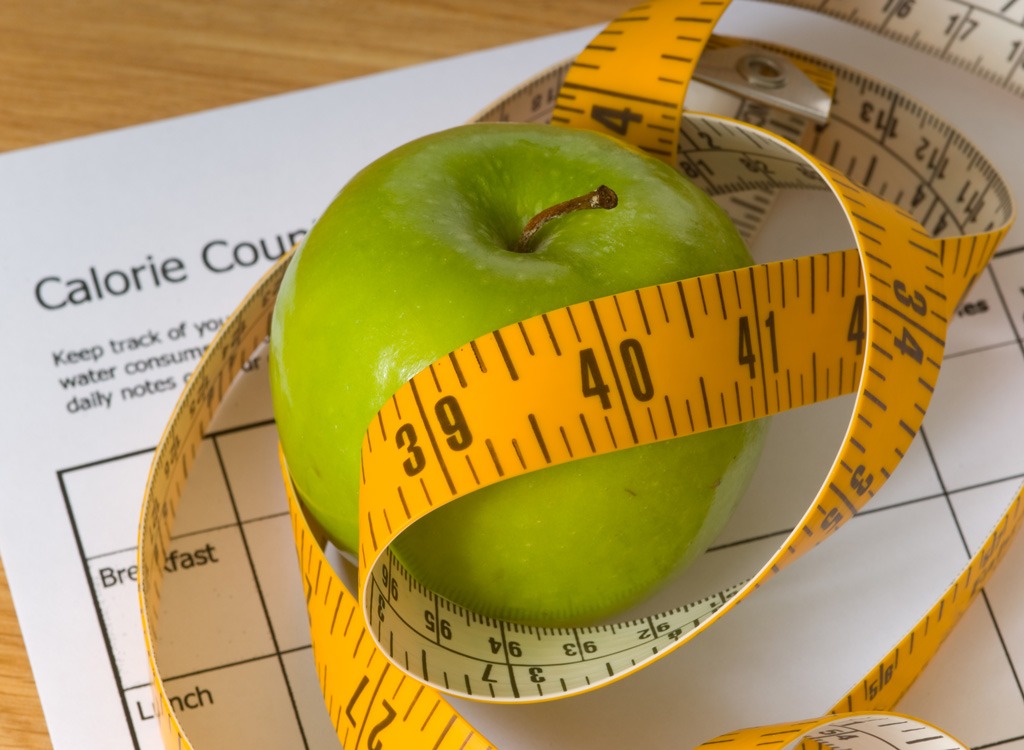
Sorry to break it to ya, but a calorie is not just a calorie. The body uses and stores calories differently depending on the nutrients each food is comprised of. Corn and beans, for example, contain something called resistant starch, which is a type of carb that hard to digest—in a good way. With resistant starch, the body isn't able to absorb as many of the calories or as much of the glucose—a nutrient that's stored as fat if it's not burned off. It's a similar story with lean protein sources like turkey, chicken, and salmon. In addition to boosting satiety, protein also has a high thermogenic effect compared to fats and carbs. So, your body burns off a fair percentage of the meat's calories during the digesting process and post-meal calorie burn spikes by as much as 35%! But your favorite cookies can't make that same claim. In fact, since the majority of sweet treats' calories come from sugar, getting too many of your calories from desserts can leave you hungry and reaching back into the bag for round two.
Who You Dine With Matters
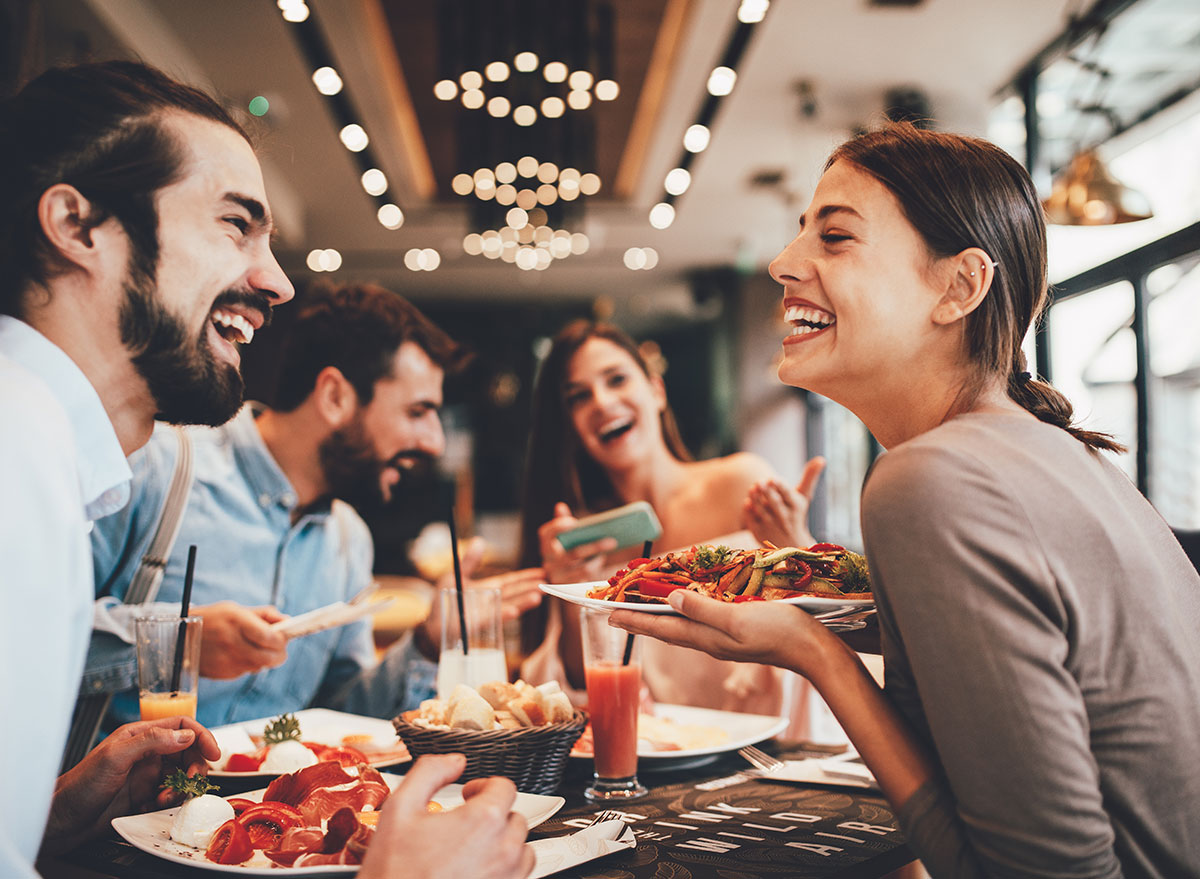
It's great to be social and have a lot of friends, but if grabbing food is your hangout of choice, you could be setting yourself up for weight gain. According to research published in the journal Nutrition, a meal consumed with one other person is typically 33% larger than a meal savored alone. It gets scarier from there. Third-wheeling with two friends? You're looking at a 47% bigger meal. Dining with four, six, or more than 8 friends was associated with meal increases of 69, 70 and 96%, respectively. Although part of this has to do with the amount of time we spend at the table when dining with company, another study from the journal Appetite found that people who spent a longer eating because they were simultaneously reading didn't eat significantly more…meaning time isn't the only factor at play here. You can still hang out with your friends. Just mix things up once and awhile. Check out a museum, see a movie, try a new workout class, go for a walk, or sneak in some of these one or two of these 19 Ways to Burn 100 Calories Without a Gym. You'll save money and calories.
A Flat Belly = A Thick Wallet
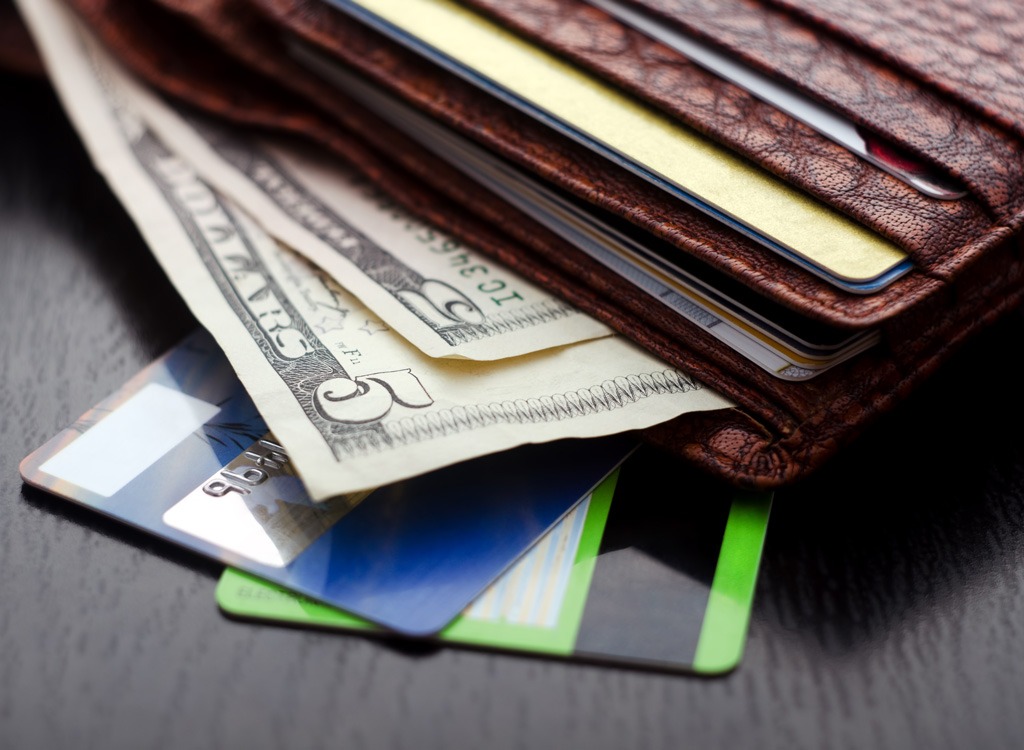
You already know that reaching a healthy weight can ward off things like heart disease and diabetes, but did you know that losing weight can also help improve the symptoms of your current conditions? That means you might be able to take lower doses of your current medications or stop taking certain meds altogether (which will save you tons of cash!). Check in with your doctor and see what types of changes he or she thinks the slimmer you might benefit from and then use her intel as inspiration to lose that weight for good! And for more ways to save money and slim down, check out these 17 Simple Swaps That Save $255 a Month on Groceries.
Weight Gain Isn't Always Your Fault

Despite your healthy diet and active lifestyle, you're piling on the pounds. What gives? You might have a thyroid condition called hypothyroidism. "Patients with hypothyroidism will have a generalized slowing of their metabolism and reduction in their basal metabolic rate (or BMR)," explains Dr. Reshmi Srinath, assistant professor of Endocrinology, Diabetes and Bone Diseases at Mount Sinai. "This can lead to changes in the way their body expends energy. With a lower metabolic rate, people may gain excess weight eating a similar diet. Some of this may be excess fat, but there may also be fluid retention." So, even if you're diligently dieting and working out, weight gained due to a thyroid issue will be difficult to lose because the extra pounds are mostly from the excess accumulation of salt and water, rather than fat. "Have yours checked if there's any doubt," warns Lauren Slayton, MS, RD. "Thyroid issues are more common after 40."
Calories From Your Drinks Count
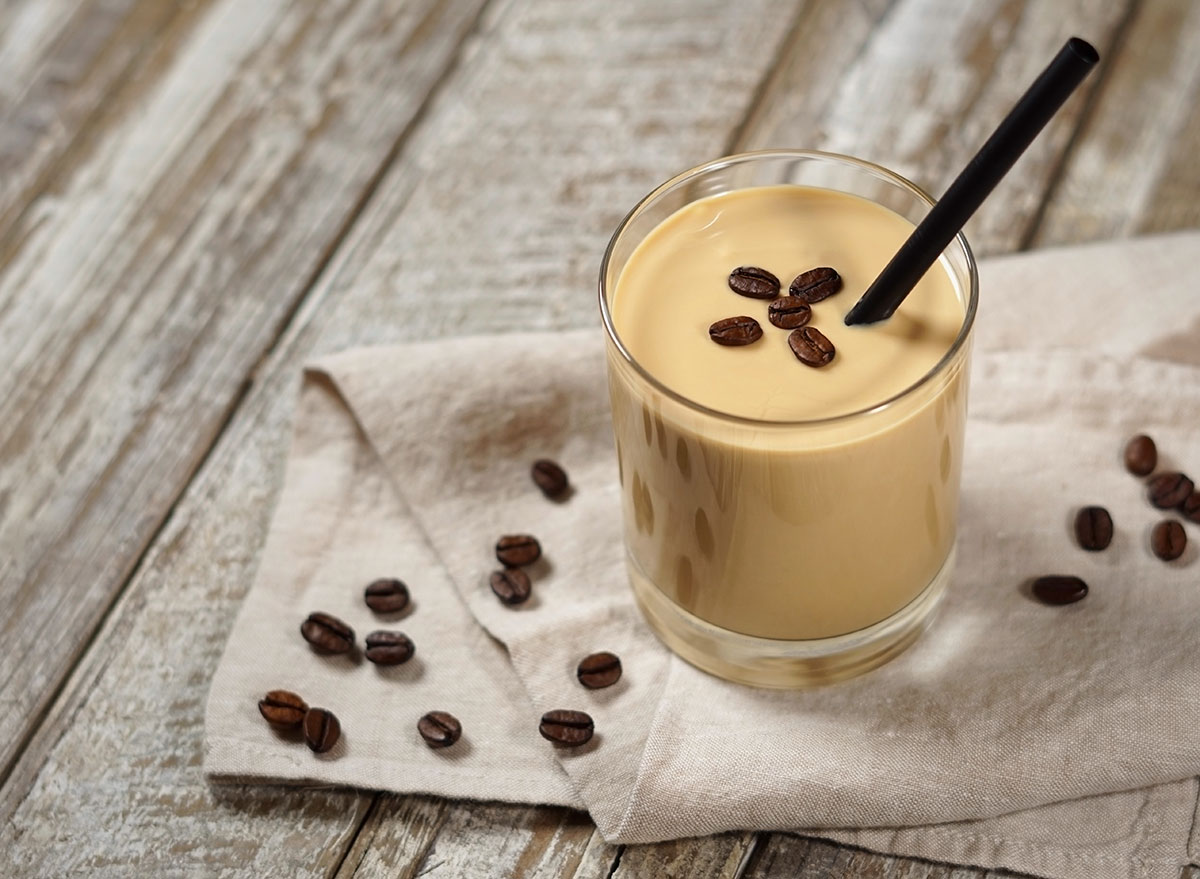
Oftentimes, people forget about the calories they sip. While they may not fill you up like the calories that you chew, there's no doubt that they can contribute to weight gain. If you're still drinking things like sugary juice, dessert-like coffee, or soda at this point in your life, it's time to stop—seriously. You'll be surprised how much weight you'll lose by simply trading in these bad-for-you drinks for things like water, black coffee, and detox tea.
Your Kitchen Affects Your Diet

If you have a sweet tooth, it's time to kick your glass cookie jar to the curb and hide your candy stash in the cabinet! In a study by Google, placing chocolate candies in opaque containers as opposed to glass ones and giving healthier snacks more prominent shelf space, curbed M&M consumption by 3.1 million calories in just seven weeks. The layout of your home can also derail your diet efforts. A recent University of Notre Dame study found that 'open concept kitchens,' which have greater visibility and convenience of food access, increase the odds of nibbling. Study participants consumed, on average, an extra 170 calories than their counterparts who spent time in a "closed" floor-plan kitchen. "Considering that decreasing calorie consumption by 50 to 100 calories per day can reduce or avoid the average annual weight gain of one to two pounds among US adults, these results have important implications for designers of and consumers in residential kitchens," the study authors note. Simply being aware of this can flat belly barrier can help you keep nibbling in check. For more simple ways to slim down, check out these 25 Easy Ways to Lose 10 Pounds.
A Trim Belly is Good for Your Love Life

Every time you're thinking about throwing in the towel with your weight loss plan, remember this: Thanks to rising testosterone levels, as your BMI dips, you're more easily aroused. In one Journal of Clinical Endocrinology and Metabolism study, heavier men had T-levels comparable to gents nearly a full decade older. You may also feel less self-conscious in the nude, which can increase your desire to get it on, too.
Your Job Can Work Against You

Maybe it's an over-the-top petty coworker or a boss who micromanages your every move. These little stressors still add up—and not only can stress cause headaches, stomach distress, high blood pressure, chest pain, and sleep disturbances, it also causes the body to metabolize food more slowly, according to a Biological Psychiatry study. To add insult to injury, the types of food we crave when we're stressed out tend to be fat and sugar-laden treats like doughnuts and chocolate. Researchers say that the combination of high-calorie cravings and a stress-induced snail-paced metabolic rate can result in significant weight gain. To keep your metabolism running strong, plaster a smile on your face and fight stress with some good cheer. Research shows that smiling and laughing causes levels of stress hormones to diminish. Combine that with another effective outlet—a mini workout at lunch, a walk around the block to get a dose of nature, or some yoga stretches—and you'll keep your stress levels more balanced.
A Trim Waist Can Keep Pain at Bay
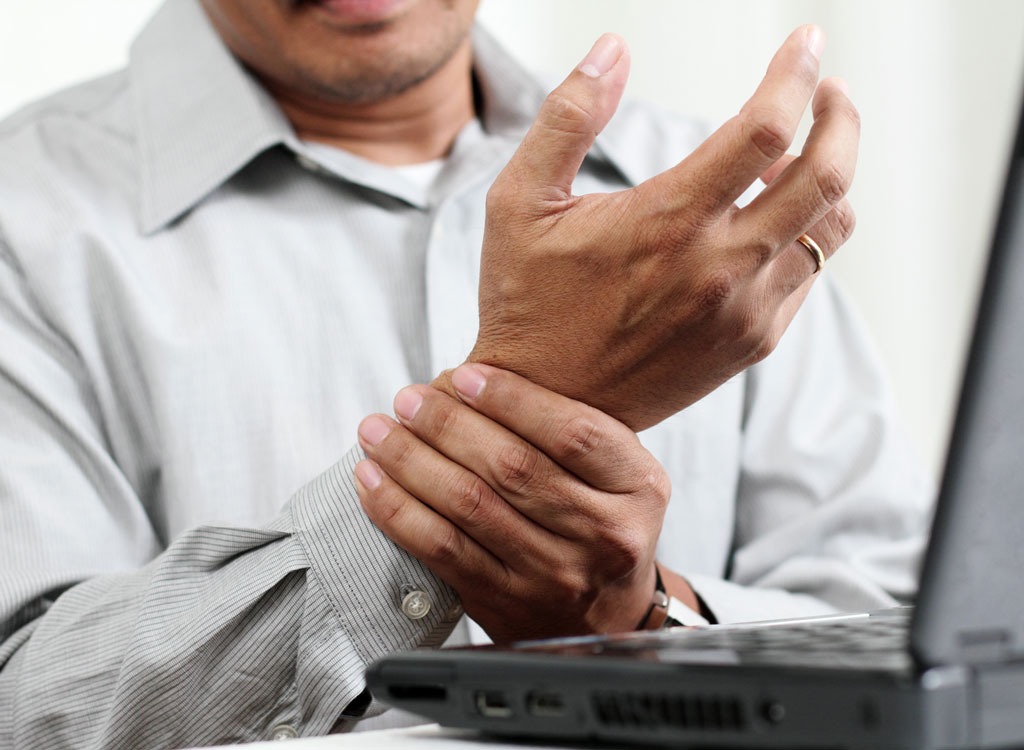
Need another reason to try to stay on top of those creeping pounds? The heavier you become, the more strain you'll exert onto your joints. While everyone has to deal with everyday wear and tear on their joints, those who are overweight build up excess stress on these same joints. On top of that, inflammatory factors that are associated with weight gain could contribute to trouble in smaller joints, such as your hands. That's why an anti-inflammatory diet has been shown to help alleviate arthritis symptoms.
A Flat Belly May Earn You a Raise

Turns out that your boss may treat you better if work to ward off those expanding hips. Obese people, especially women, make about 2.5% less than their normal-weight co-workers, according to a study in Health Economics. And another study conducted by University of Florida researchers found that the total swing in salaries between those who are slender or stocky amounts to an astounding $598,425. Think going on a diet might be worth a cool 600 G's? We do.
Salads Really Can Help You Lose Weight
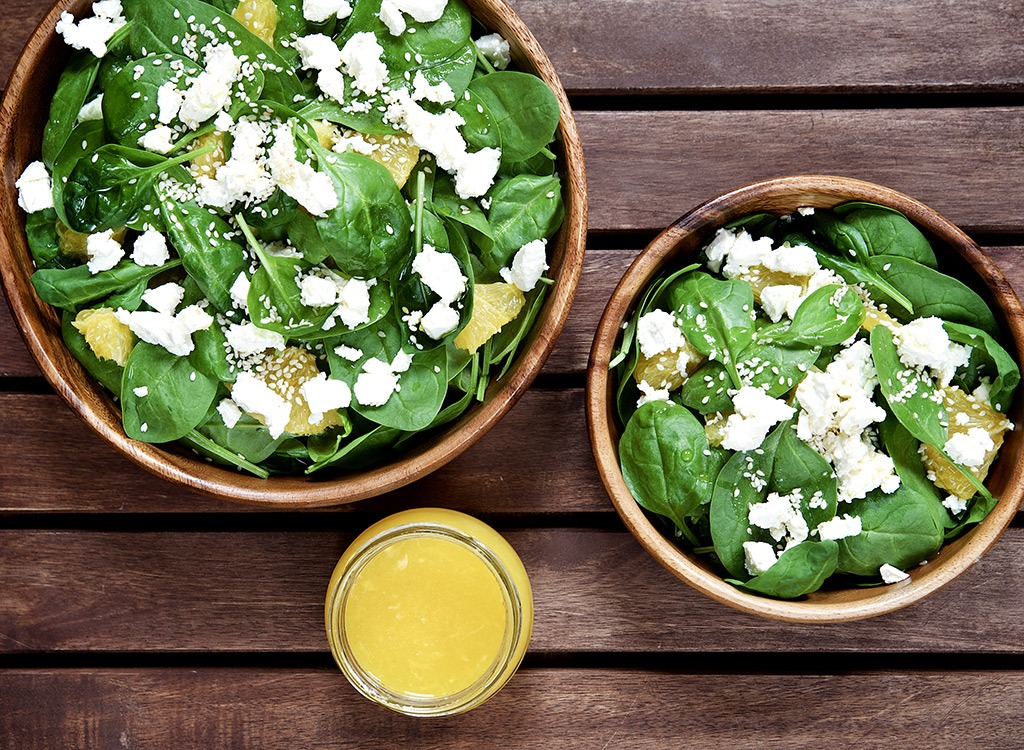
While not every salad is a healthy one, eating a house salad before you eat really can help you lose excess pounds. A study by researchers at the University of Pennsylvania found that volunteers who ate a large vegetable salad before their main dish ate fewer calories than those who didn't. Just make sure you keep it simple by foregoing creamy (read: fattening) dressings and opt for only oil and vinegar. And skip the cheese and croutons, too.
Inflammation Influences Your Waistline
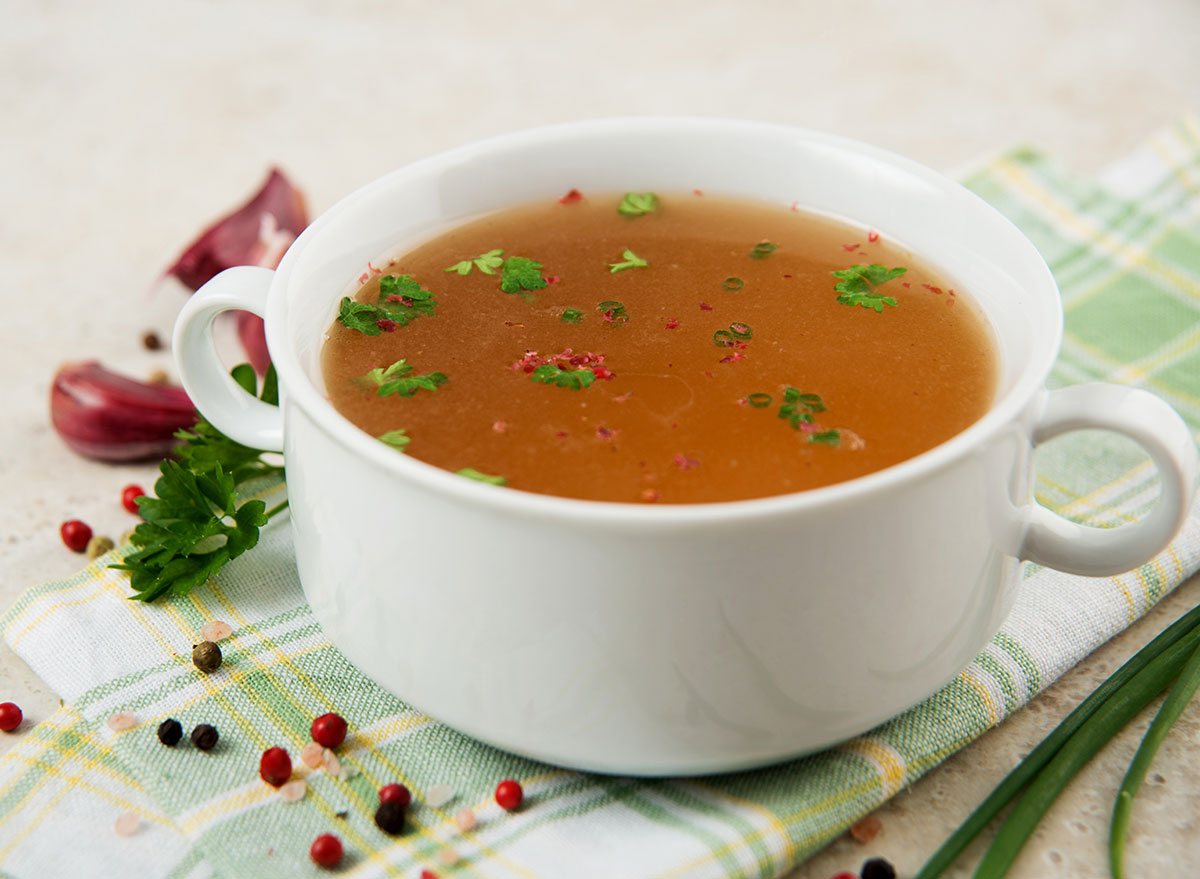
Inflammation doesn't just cause joint pain that will sideline you from your workout, it can also cause your body to decrease levels of pro-inflammatory biomarkers—many of which will torch fat and help you stay lean. Those there are many sources of the stuff. Bone broth is one of the easiest to consume.
To make it, bones are left to simmer in water for an extended period of time, extracting and breaking down their collagen and other nutrients. Some of that broken down material from the cartilage and tendons is glucosamine (which you may have seen sold as a supplement for arthritis and joint pain). According to a study published in the journal PLoS One, when overweight, middle-aged adults took a glucosamine supplement, they were able to decrease serum CRP (inflammation biomarker) levels by 23% more than those who didn't take a supplement. The stock is also full of anti-inflammatory amino acids (glycine and proline), and the ample levels of gelatin will help rebuild your gut lining to further assist with your anti-inflammatory gut microbes.

